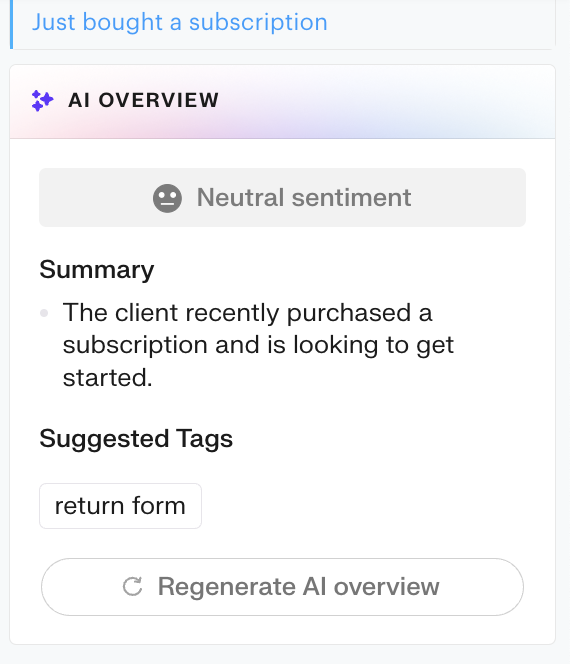The buzz around AI is undeniable, and its effects are far-reaching. Recently, we’ve seen marked changes in the customer service world, as more companies start using AI-based tools regularly.
In fact, you may have heard people talking about how AI might replace customer service agents. So far that hasn’t been the case. Instead, these tools have helped human agents improve the customer experience.
But businesses are still exploring how AI can help them. What does this mean for the future of customer service? Will AI replace humans entirely?
I don’t have a crystal ball, but I do have some thoughts on the subject. Let’s talk about how AI is used for customer service, what it can and can’t do, and how your team can leverage its power effectively.
How AI Is Impacting Customer Service
Businesses across many industries are rapidly adopting AI-powered tools to enhance the customer service experience. And the interest is only growing. Recent statistics predict that:
- 80% of customer service organizations will apply generative AI technology to improve the customer experience by 2025.
- Nearly 95% of CEOs anticipate accelerated use of new technologies like generative AI to meet increasing customer expectations.
The surge in adoption of AI is driven by a desire to revolutionize customer interactions, streamline operations, and provide more personalized experiences. Currently, businesses are using AI for:
- 24/7 support. AI-powered chatbots and virtual assistants provide round-the-clock customer support. They handle routine inquiries, so human agents can focus on more demanding customer needs.
- Personalization. AI can be used to more quickly analyze customer data, and provide tailored recommendations and personalized experiences.
- Efficient routing. Some AI systems intelligently route customer inquiries to the most appropriate agents or departments.
- Predictive support. By analyzing patterns in customer behavior, AI can anticipate needs and offer proactive solutions before problems escalate.
- Sentiment analysis. Dedicated AI tools can detect customer emotions and sentiment, allowing for more empathetic and contextually appropriate responses.

All of these (and more) offer real, concrete benefits. Businesses are using AI technology right now to save time and resources while providing better customer service.
For example, one insurance company implemented Tucan.ai’s AI system for its customer service operations, and got the following results:
- Achieved a 76% automation rate for email inquiries
- Cut average response times from 3.5 days to just 4 hours
- Used proprietary “chunking” technology to achieve 98% response accuracy
- Significantly reduced operating costs by decreasing reliance on manual labor
- Improved work processes, leading to greater job satisfaction among customer service employees
MetLife introduced AI technology in its call centers to offer better customer assistance. And just like the insurance company, it got some pretty impressive results:
- Implemented dynamic analysis of client emotions and tones during calls
- Empowered agents to better understand customer needs and tailor their responses accordingly
- Gathered valuable insights into communication quality for targeted coaching
- Achieved a 3.5% increase in first-call resolutions
- Boosted customer satisfaction by 13%
Where AI Falls Short When Used for Customer Support
There’s no doubt that AI can be useful in customer service. The examples and case studies I mentioned above are only the tip of the iceberg.
At the same time, it’s important to recognize the limitations of AI. There are certain aspects of human interaction that are very important for delivering exceptional customer experiences. And these are areas where AI currently (and probably always will) fall short.
Understanding Nuance and Emotion
Human communication has subtleties that AI can’t fully grasp.
For example, a customer who’s frustrated might need more than a quick solution. They want reassurance, empathy, and a genuine understanding of their situation. A human agent can pick up on tone, inflection, and unspoken cues to tailor their response and choose an appropriate communication style.
AI, on the other hand, is simply guessing at the best responses. It can’t adjust to and address human emotional needs effectively. Remember the last time you were frustrated with a service? I don’t know about you, but I wouldn’t have appreciated a robotic response.
AI can help with simple inquiries and common questions, sure. But it’s not going to help an angry customer feel heard. For that reason alone, relying too heavily on AI isn’t an effective way to build customer loyalty.
Tackling Complex Problems
Artificial intelligence handles routine inquiries well. However, when faced with unique or complicated problems, it often falters. These situations require human ingenuity, critical thinking, and the ability to think outside the box.
For example, let’s say a customer has encountered an unusual technical glitch. A human agent can draw on their experience, available resources, and problem-solving skills to diagnose the issue and find a tailored solution.
AI, on the other hand, will struggle to navigate this unforeseen scenario. If there’s little or no specific information to draw on about the technical issue, the AI will offer generic troubleshooting steps instead. The solutions it presents are less likely to work, adding to customer frustration.
Building Genuine Connections
Customer satisfaction and loyalty stem from trust, rapport, and genuine human connection. While AI can personalize interactions to a certain extent (such as by repeating the customer’s name or key details), it can’t replicate what an experienced human agent brings to the table.
A truly human touch creates a sense of community and belonging. This is important for fostering loyalty that goes beyond simple transactional exchanges.
Customers like it when you understand them and make them valued. Especially if your customer base is small, or if you rely on retention, making the most of each relationship is vital. Machines just can’t build those kinds of connections.
Will AI Replace Human Customer Service? (Hint: The Answer Is No)
It’s true that AI can automate tasks and improve efficiency. But it lacks the emotional intelligence, critical thinking skills, and human touch that are essential for navigating complex customer interactions.
AI isn’t going to replace human customer service agents. Period. Full stop.
So does that mean you should ignore all the latest AI developments? Of course not! AI is useful. It’s just that it should be seen as a tool to help your customer support team save time and perform better – not as a replacement.
AI shines brightest when used to simplify tasks and handle basic questions that come up time and time again. You know what your support agents don’t need to do? Answer “What are your business hours?” and “How do I reset my password?” all day.
The best results come when you combine the strengths of humans and AI. When you integrate AI carefully and thoughtfully, you empower your support team to be even better at their jobs.
Let AI handle some of your team’s routine work. Then make sure it’s available as a tool they can reach for whenever they like. When dealing with tricky problems, AI can’t offer solutions, but it can provide your agents with relevant information and suggestions.

That means quicker problem solving – and fast, effective service makes a world of difference to retention and the overall customer experience.
Supercharge Your Customer Support Team: Human and AI Alike
AI in customer service isn’t about replacing humans – it’s about supercharging them.
These technologies handle or speed up routine work. Meanwhile, your team can focus on what it does best: solving tricky problems and building those all-important customer relationships.
For small businesses, this is a game changer. You can offer the kind of 24/7, efficient service that used to be reserved for big players. And you can achieve that while retaining a personal touch.
At the end of the day, customers are humans who want to connect with other humans. AI is just the tool that makes those connections even better. So don’t be afraid to embrace AI, but don’t forget the irreplaceable value of your team.
Ready to take your customer service to the next level?
Groove, our support helpdesk for small businesses, offers AI-powered tools and other features that assist your team in offering quality customer service. Check out a free trial of Groove today, and expand your support toolkit!




